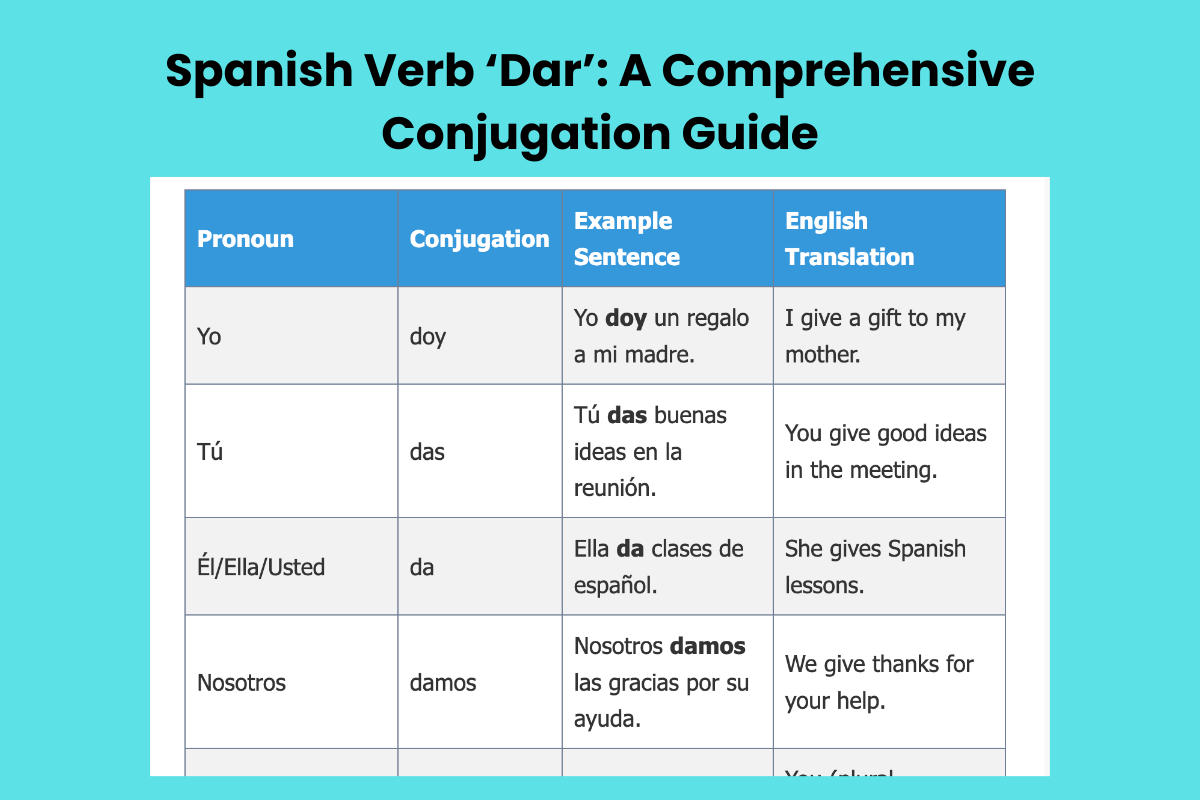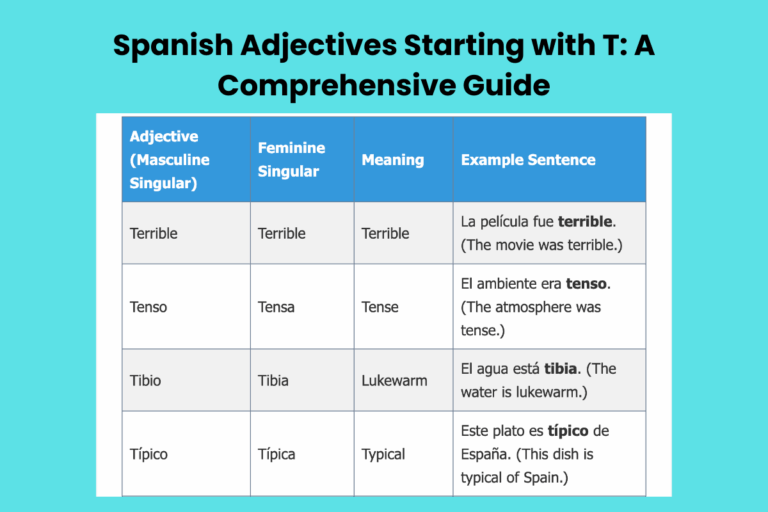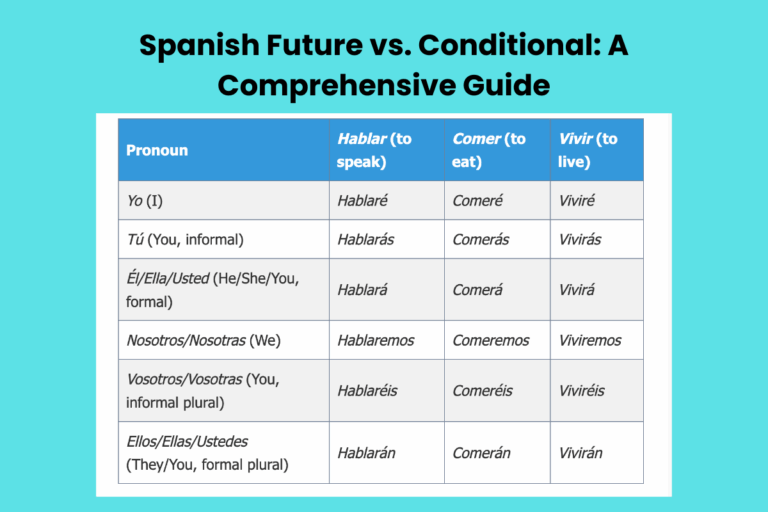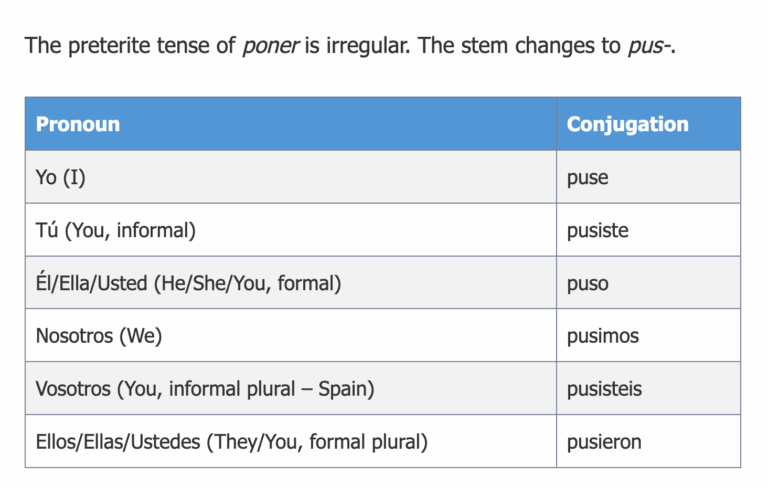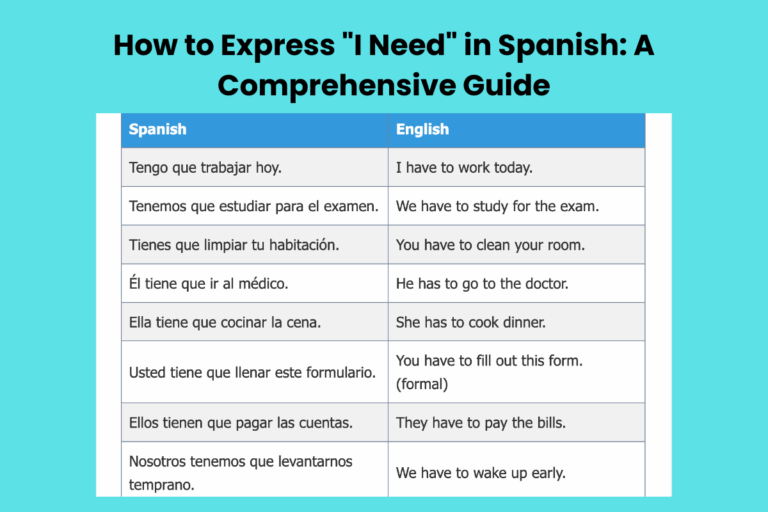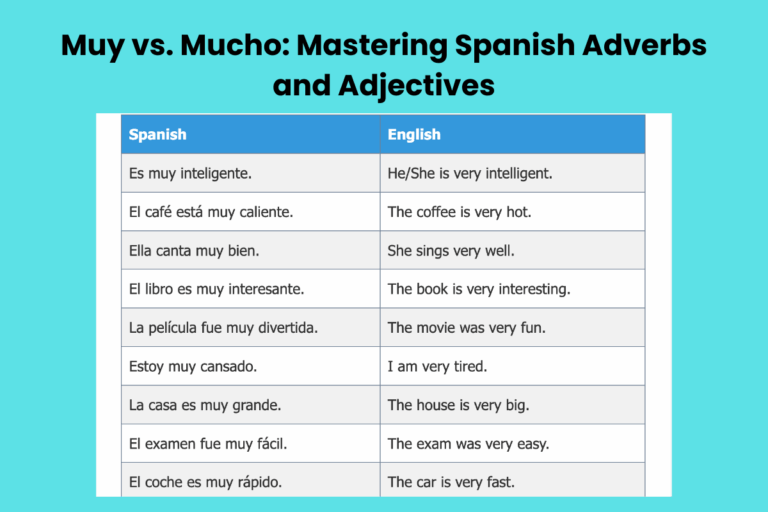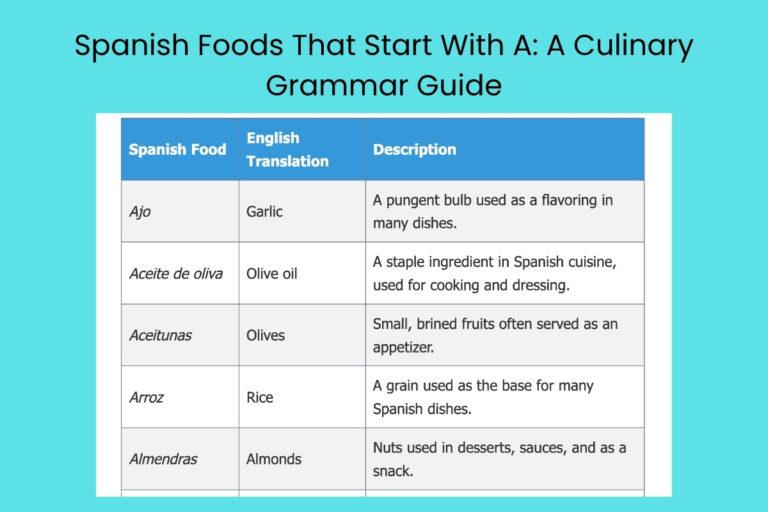Spanish Verb ‘Dar’: A Comprehensive Conjugation Guide
Mastering the Spanish verb dar (to give) is crucial for fluency. It’s a fundamental verb used in countless daily interactions and expressions. From offering a gift to providing information, dar is indispensable. This guide offers a detailed exploration of dar‘s conjugations across various tenses and moods, providing you with the knowledge and practice needed to use it confidently. Whether you’re a beginner or an advanced learner, this comprehensive resource will enhance your understanding and application of this essential verb.
Understanding how to conjugate dar accurately will significantly improve your ability to communicate effectively in Spanish. This skill will be beneficial for students, travelers, and anyone looking to improve their Spanish language skills.
Table of Contents
- Definition of ‘Dar’
- Structural Breakdown of ‘Dar’ Conjugation
- Types and Categories of Conjugation
- Examples of ‘Dar’ Conjugation
- Usage Rules for ‘Dar’
- Common Mistakes When Using ‘Dar’
- Practice Exercises
- Advanced Topics: Idiomatic Expressions with ‘Dar’
- Frequently Asked Questions (FAQ)
- Conclusion
Definition of ‘Dar’
The Spanish verb dar is a transitive verb that primarily means “to give.” It is one of the most fundamental and frequently used verbs in the Spanish language. Its uses extend beyond the simple act of giving an object; it can also mean “to provide,” “to offer,” “to grant,” or “to hit,” depending on the context. Dar is an irregular verb, meaning its conjugation does not follow the standard patterns of regular verbs in Spanish.
Dar belongs to the first conjugation group (-ar verbs), but it exhibits irregularities in several tenses, particularly in the present indicative and subjunctive moods. Understanding these irregularities is essential for accurate communication. It’s a crucial element in expressing actions related to offering, granting, or providing something, whether tangible or intangible.
The verb dar is a cornerstone of Spanish vocabulary. Its versatility allows it to be used in a wide range of contexts, from everyday conversations to more formal settings. Its importance is underscored by its presence in many idiomatic expressions, further enriching its significance in the language and making its mastery essential for any language learner.
Structural Breakdown of ‘Dar’ Conjugation
The conjugation of dar involves understanding its stem and the endings that are added to it in different tenses and moods. Although it is an -ar verb, the present indicative and subjunctive forms have irregular stems. For example, in the present indicative, the first-person singular form is doy, not daro, demonstrating the irregularity.
The verb’s structure changes depending on the tense and mood. In the preterite (past) tense, the stem remains consistent, and the endings follow a regular pattern for -ar verbs.
However, the present subjunctive exhibits significant stem changes. The imperfect and future tenses are more regular, adhering to standard -ar verb conjugation rules.
Here’s a breakdown of how the stem changes in different tenses:
- Present Indicative: doy, das, da, damos, dais, dan (irregular in the yo form)
- Preterite Indicative: di, diste, dio, dimos, disteis, dieron (irregular)
- Imperfect Indicative: daba, dabas, daba, dábamos, dabais, daban (regular)
- Future Indicative: daré, darás, dará, daremos, daréis, darán (regular)
- Conditional Indicative: daría, darías, daría, daríamos, daríais, darían (regular)
- Present Subjunctive: dé, des, dé, demos, deis, den (irregular)
- Imperfect Subjunctive: diera/diese, dieras/dieses, diera/diese, diéramos/diésemos, dierais/dieseis, dieran/diesen (irregular)
- Future Subjunctive: diere, dieres, diere, diéremos, diereis, dieren (rarely used)
Understanding these stem changes and the corresponding endings is crucial for accurately conjugating dar. Pay close attention to the irregular forms in the present indicative, preterite, and present subjunctive, as these are the most common sources of errors.
Types and Categories of Conjugation
The conjugation of dar varies significantly depending on the mood. The three main moods in Spanish are the indicative, subjunctive, and imperative. Each mood expresses a different attitude or intention of the speaker.
Indicative Mood
The indicative mood is used to express factual statements and objective realities. It is the most common mood and includes various tenses such as present, preterite, imperfect, future, and conditional.
Each tense within the indicative mood conveys a specific time frame or condition.
For example, the present indicative (doy, das, da) is used for actions happening now. The preterite (di, diste, dio) is used for completed actions in the past. The imperfect (daba, dabas, daba) describes ongoing or habitual actions in the past. The future (daré, darás, dará) expresses actions that will happen in the future, and the conditional (daría, darías, daría) expresses what would happen under certain conditions.
Subjunctive Mood
The subjunctive mood expresses doubt, uncertainty, wishes, emotions, or hypothetical situations. It is often used in subordinate clauses that are introduced by conjunctions such as que (that), si (if), or para que (so that). The subjunctive mood is less straightforward than the indicative mood and requires careful attention to context.
The present subjunctive (dé, des, dé) is used for present or future hypothetical situations. The imperfect subjunctive (diera/diese, dieras/dieses, diera/diese) is used for past hypothetical situations or to express politeness. The future subjunctive (diere, dieres, diere) is rarely used in modern Spanish, typically appearing in legal or literary contexts.
Imperative Mood
The imperative mood is used to give commands or instructions. It only has forms for the tú, usted, nosotros, vosotros, and ustedes pronouns. The imperative forms are often derived from the present subjunctive.
For example, the affirmative tú form is da (give), while the negative tú form is no des (do not give). The usted form is dé (give), and the ustedes form is den (give). The imperative mood is essential for expressing direct orders or requests.
Examples of ‘Dar’ Conjugation
To fully understand the conjugation of dar, it is essential to see it used in various contexts. The following examples provide a comprehensive overview of dar in different tenses and moods.
Present Indicative Examples
The present indicative is used to describe actions happening now or habitual actions. The yo form is irregular (doy), while the other forms are more regular, though still require attention.
The table below provides example sentences using the present indicative form of dar.
| Pronoun | Conjugation | Example Sentence | English Translation |
|---|---|---|---|
| Yo | doy | Yo doy un regalo a mi madre. | I give a gift to my mother. |
| Tú | das | Tú das buenas ideas en la reunión. | You give good ideas in the meeting. |
| Él/Ella/Usted | da | Ella da clases de español. | She gives Spanish lessons. |
| Nosotros | damos | Nosotros damos las gracias por su ayuda. | We give thanks for your help. |
| Vosotros | dais | Vosotros dais mucho apoyo a vuestros amigos. | You (plural, informal) give a lot of support to your friends. |
| Ellos/Ellas/Ustedes | dan | Ellos dan comida a los necesitados. | They give food to those in need. |
| Yo | doy | Yo doy mi palabra de que cumpliré mi promesa. | I give my word that I will fulfill my promise. |
| Tú | das | ¿Tú das la respuesta correcta en la clase? | Do you give the correct answer in class? |
| Él/Ella/Usted | da | Él da una caminata todos los días. | He takes a walk every day. |
| Nosotros | damos | Nosotros damos una fiesta para celebrar. | We are giving a party to celebrate. |
| Vosotros | dais | Vosotros dais siempre lo mejor de vosotros. | You (plural, informal) always give your best. |
| Ellos/Ellas/Ustedes | dan | Ellas dan conciertos en el parque. | They give concerts in the park. |
| Yo | doy | Yo doy de comer al perro cada mañana. | I feed the dog every morning. |
| Tú | das | Tú das una buena impresión a todos. | You give a good impression to everyone. |
| Él/Ella/Usted | da | Mi jefe da bonos a los empleados. | My boss gives bonuses to the employees. |
| Nosotros | damos | Nosotros damos prioridad a la seguridad. | We give priority to safety. |
| Vosotros | dais | Vosotros dais ideas innovadoras en el trabajo. | You (plural, informal) give innovative ideas at work. |
| Ellos/Ellas/Ustedes | dan | Mis padres dan consejos muy sabios. | My parents give very wise advice. |
| Yo | doy | Yo doy clases particulares de inglés. | I give private English lessons. |
| Tú | das | Tú das un paseo por el parque los domingos. | You take a walk in the park on Sundays. |
Preterite Indicative Examples
The preterite indicative is used to describe completed actions in the past. This tense is irregular, so memorization is key.
The table below provides example sentences using the preterite indicative form of dar.
| Pronoun | Conjugation | Example Sentence | English Translation |
|---|---|---|---|
| Yo | di | Yo di un discurso en la conferencia. | I gave a speech at the conference. |
| Tú | diste | Tú diste una propina al camarero. | You gave a tip to the waiter. |
| Él/Ella/Usted | dio | Él dio una fiesta de cumpleaños. | He gave a birthday party. |
| Nosotros | dimos | Nosotros dimos una donación a la caridad. | We gave a donation to charity. |
| Vosotros | disteis | Vosotros disteis regalos a los niños. | You (plural, informal) gave gifts to the children. |
| Ellos/Ellas/Ustedes | dieron | Ellos dieron su apoyo al proyecto. | They gave their support to the project. |
| Yo | di | Ayer yo di mi opinión sobre el asunto. | Yesterday I gave my opinion on the matter. |
| Tú | diste | ¿Tú diste una excusa para llegar tarde? | Did you give an excuse for being late? |
| Él/Ella/Usted | dio | El profesor dio una explicación clara. | The professor gave a clear explanation. |
| Nosotros | dimos | Nosotros dimos un paseo por la playa. | We took a walk on the beach. (We gave a walk) |
| Vosotros | disteis | Vosotros disteis una sorpresa a vuestra madre. | You (plural, informal) gave your mother a surprise. |
| Ellos/Ellas/Ustedes | dieron | Las flores dieron un toque de color al jardín. | The flowers gave a touch of color to the garden. |
| Yo | di | Yo di una vuelta en bicicleta. | I took a bike ride (I gave a turn on a bike). |
| Tú | diste | Tú diste la mano a tu competidor. | You shook hands with your competitor. |
| Él/Ella/Usted | dio | El concierto dio comienzo a las ocho. | The concert began at eight o’clock. |
| Nosotros | dimos | Nosotros dimos por hecho que vendrías. | We took it for granted that you would come. |
| Vosotros | disteis | Vosotros disteis una oportunidad al nuevo empleado. | You (plural, informal) gave the new employee an opportunity. |
| Ellos/Ellas/Ustedes | dieron | Los resultados dieron una nueva perspectiva. | The results gave a new perspective. |
| Yo | di | Yo di un susto a mi hermano. | I gave my brother a scare. |
| Tú | diste | Tú diste la noticia con mucha calma. | You gave the news very calmly. |
Imperfect Indicative Examples
The imperfect indicative is used to describe ongoing or habitual actions in the past. This tense is regular for -ar verbs, making it easier to learn.
It expresses what *used to happen* or *was happening*.
The table below provides example sentences using the imperfect indicative form of dar.
| Pronoun | Conjugation | Example Sentence | English Translation |
|---|---|---|---|
| Yo | daba | Yo daba clases de piano cuando era niño. | I used to give piano lessons when I was a child. |
| Tú | dabas | Tú dabas consejos a tus amigos. | You used to give advice to your friends. |
| Él/Ella/Usted | daba | Ella daba de comer a los pájaros cada mañana. | She used to feed the birds every morning. |
| Nosotros | dábamos | Nosotros dábamos paseos por el parque los domingos. | We used to take walks in the park on Sundays. |
| Vosotros | dabais | Vosotros dabais fiestas en vuestra casa. | You (plural, informal) used to give parties at your house. |
| Ellos/Ellas/Ustedes | daban | Ellos daban conciertos gratuitos en la plaza. | They used to give free concerts in the square. |
| Yo | daba | Antes yo daba mucha importancia a las opiniones de los demás. | Before, I used to give a lot of importance to the opinions of others. |
| Tú | dabas | ¿Tú dabas una mano a tus vecinos cuando lo necesitaban? | Did you used to give a hand to your neighbors when they needed it? |
| Él/Ella/Usted | daba | Él daba por sentado que aprobaría el examen. | He used to take it for granted that he would pass the exam. |
| Nosotros | dábamos | Nosotros dábamos prioridad a la familia sobre el trabajo. | We used to give priority to family over work. |
| Vosotros | dabais | Vosotros dabais siempre lo mejor de vosotros en el deporte. | You (plural, informal) used to always give your best in sports. |
| Ellos/Ellas/Ustedes | daban | Ellas daban discursos inspiradores en la escuela. | They used to give inspiring speeches at school. |
| Yo | daba | Yo daba la bienvenida a los nuevos empleados. | I used to welcome the new employees. |
| Tú | dabas | Tú dabas ánimos a tus compañeros de equipo. | You used to encourage your teammates. |
| Él/Ella/Usted | daba | El sol daba calor a la tierra. | The sun used to give warmth to the earth. |
| Nosotros | dábamos | Nosotros dábamos las gracias cada noche antes de dormir. | We used to give thanks every night before sleeping. |
| Vosotros | dabais | Vosotros dabais importancia a los pequeños detalles. | You (plural, informal) used to give importance to the small details. |
| Ellos/Ellas/Ustedes | daban | Ellos daban por hecho que tendrían éxito. | They used to take it for granted that they would succeed. |
| Yo | daba | Yo daba un paseo en bicicleta todos los días. | I used to take a bike ride every day. |
| Tú | dabas | Tú dabas una fiesta para celebrar cada cumpleaños. | You used to give a party to celebrate every birthday. |
Future Indicative Examples
The future indicative is used to describe actions that will happen in the future. This tense is regular for -ar verbs.
The table below provides example sentences using the future indicative form of dar.
| Pronoun | Conjugation | Example Sentence | English Translation |
|---|---|---|---|
| Yo | daré | Yo daré una fiesta el próximo mes. | I will give a party next month. |
| Tú | darás | Tú darás un discurso en la ceremonia. | You will give a speech at the ceremony. |
| Él/Ella/Usted | dará | Ella dará su opinión sobre el proyecto. | She will give her opinion on the project. |
| Nosotros | daremos | Nosotros daremos una sorpresa a nuestro padre. | We will give our father a surprise. |
| Vosotros | daréis | Vosotros daréis regalos a los invitados. | You (plural, informal) will give gifts to the guests. |
| Ellos/Ellas/Ustedes | darán | Ellos darán su apoyo a la iniciativa. | They will give their support to the initiative. |
| Yo | daré | En el futuro yo daré más importancia a mi salud. | In the future, I will give more importance to my health. |
| Tú | darás | ¿Tú darás una mano a tus amigos cuando te necesiten? | Will you give a hand to your friends when they need you? |
| Él/Ella/Usted | dará | Él dará por terminado el proyecto la semana que viene. | He will finish the project next week. |
| Nosotros | daremos | Nosotros daremos una oportunidad a los jóvenes talentos. | We will give an opportunity to young talents. |
| Vosotros | daréis | Vosotros daréis siempre lo mejor de vosotros en el trabajo. | You (plural, informal) will always give your best at work. |
| Ellos/Ellas/Ustedes | darán | Ellas darán discursos motivadores en la conferencia. | They will give motivational speeches at the conference. |
| Yo | daré | Yo daré la bienvenida a los nuevos miembros del equipo. | I will welcome the new members of the team. |
| Tú | darás | Tú darás ánimos a tus compañeros antes de la competencia. | You will encourage your teammates before the competition. |
| Él/Ella/Usted | dará | El gobierno dará ayudas a las familias necesitadas. | The government will give aid to families in need. |
| Nosotros | daremos | Nosotros daremos las gracias a todos los que nos apoyaron. | We will give thanks to everyone who supported us. |
| Vosotros | daréis | Vosotros daréis importancia a la sostenibilidad en vuestra empresa. | You (plural, informal) will give importance to sustainability in your company. |
| Ellos/Ellas/Ustedes | darán | Ellos darán por hecho que ganarán el partido. | They will take it for granted that they will win the game. |
| Yo | daré | Yo daré un paseo por la playa mañana. | I will take a walk on the beach tomorrow. |
| Tú | darás | Tú darás una sorpresa a tu pareja en su cumpleaños. | You will give your partner a surprise on their birthday. |
Conditional Indicative Examples
The conditional indicative is used to express what would happen under certain conditions. This tense is regular for -ar verbs.
The table below provides example sentences using the conditional indicative form of dar.
| Pronoun | Conjugation | Example Sentence | English Translation |
|---|---|---|---|
| Yo | daría | Yo daría cualquier cosa por verte feliz. | I would give anything to see you happy. |
| Tú | darías | Tú darías un buen ejemplo si fueras más responsable. | You would give a good example if you were more responsible. |
| Él/Ella/Usted | daría | Ella daría su opinión si le preguntaran. | She would give her opinion if they asked her. |
| Nosotros | daríamos | Nosotros daríamos una fiesta si ganáramos la lotería. | We would give a party if we won the lottery. |
| Vosotros | daríais | Vosotros daríais más si tuvierais la oportunidad. | You (plural, informal) would give more if you had the opportunity. |
| Ellos/Ellas/Ustedes | darían | Ellos darían su apoyo si supieran cómo ayudar. | They would give their support if they knew how to help. |
| Yo | daría | Si tuviera más tiempo, yo daría clases de voluntariado. | If I had more time, I would give volunteer lessons. |
| Tú | darías | ¿Tú darías una oportunidad a alguien que lo merece? | Would you give an opportunity to someone who deserves it? |
| Él/Ella/Usted | daría | Él daría por sentado que ganaría el premio. | He would take it for granted that he would win the prize. |
| Nosotros | daríamos | Nosotros daríamos prioridad a la educación si fuéramos el gobierno. | We would give priority to education if we were the government. |
| Vosotros | daríais | Vosotros daríais siempre lo mejor de vosotros si os esforzarais más. | You (plural, informal) would always give your best if you tried harder. |
| Ellos/Ellas/Ustedes | darían | Ellas darían discursos inspiradores si tuvieran la oportunidad. | They would give inspiring speeches if they had the opportunity. |
| Yo | daría | Yo daría la bienvenida a los refugiados si pudiera. | I would welcome the refugees if I could. |
| Tú | darías | Tú darías ánimos a tus amigos si estuvieran tristes. | You would encourage your friends if they were sad. |
| Él/Ella/Usted | daría | El sol daría más calor si no hubiera tanta contaminación. | The sun would give more warmth if there wasn’t so much pollution. |
| Nosotros | daríamos | Nosotros daríamos las gracias a todos los héroes anónimos. | We would give thanks to all the anonymous heroes. |
| Vosotros | daríais | Vosotros daríais importancia a la cultura si tuvierais el poder. | You (plural, informal) would give importance to culture if you had the power. |
| Ellos/Ellas/Ustedes | darían | Ellos darían por hecho que tendrían éxito si trabajaran duro. | They would take it for granted that they would succeed if they worked hard. |
| Yo | daría | Yo daría un paseo por el mundo si tuviera el dinero. | I would take a walk around the world if I had the money. |
| Tú | darías | Tú darías una fiesta sorpresa a tus padres si pudieras. | You would give your parents a surprise party if you could. |
Present Subjunctive Examples
The present subjunctive is used to express doubt, uncertainty, wishes, or hypothetical situations in the present or future. The stem is irregular.
The table below provides example sentences using the present subjunctive form of dar.
| Pronoun | Conjugation | Example Sentence | English Translation |
|---|---|---|---|
| Yo | dé | Espero que yo dé una buena impresión. | I hope that I give a good impression. |
| Tú | des | Es importante que tú des lo mejor de ti. | It is important that you give your best. |
| Él/Ella/Usted | dé | Es necesario que ella dé su consentimiento. | It is necessary that she give her consent. |
| Nosotros | demos | Es fundamental que nosotros demos un buen ejemplo. | It is essential that we
give a good example. |
| Vosotros | deis | Es importante que vosotros deis vuestra opinión. | It is important that you (plural, informal) give your opinion. |
| Ellos/Ellas/Ustedes | den | Es crucial que ellos den su apoyo al proyecto. | It is crucial that they give their support to the project. |
| Yo | dé | No creo que yo te dé la razón en este asunto. | I don’t think that I will agree with you on this matter. |
| Tú | des | Dudo que tú me des una respuesta sincera. | I doubt that you will give me a sincere answer. |
| Él/Ella/Usted | dé | Es posible que él no dé su permiso para el viaje. | It is possible that he will not give his permission for the trip. |
| Nosotros | demos | Es improbable que nosotros demos una fiesta este año. | It is unlikely that we will give a party this year. |
| Vosotros | deis | No creo que vosotros deis importancia a los detalles. | I don’t think that you (plural, informal) give importance to the details. |
| Ellos/Ellas/Ustedes | den | Es dudoso que ellos den una solución al problema. | It is doubtful that they will give a solution to the problem. |
| Yo | dé | Quiero que yo te dé un abrazo. | I want that I give you a hug. |
| Tú | des | Prefiero que tú me des tu opinión honesta. | I prefer that you give me your honest opinion. |
| Él/Ella/Usted | dé | Insisto en que él dé una explicación. | I insist that he give an explanation. |
| Nosotros | demos | Sugiero que nosotros demos una oportunidad a los jóvenes. | I suggest that we give an opportunity to the young people. |
| Vosotros | deis | Recomiendo que vosotros deis prioridad a la seguridad. | I recommend that you (plural, informal) give priority to safety. |
| Ellos/Ellas/Ustedes | den | Aconsejo que ellos den las gracias por la ayuda. | I advise that they give thanks for the help. |
| Yo | dé | Ojalá yo te dé una sorpresa agradable. | I hope I give you a pleasant surprise. |
| Tú | des | Quizás tú me des una respuesta mañana. | Maybe you will give me an answer tomorrow. |
Imperfect Subjunctive Examples
The imperfect subjunctive is used to express hypothetical or past subjunctive actions. There are two possible conjugations: “-ra” and “-se.”
The table below provides example sentences using the imperfect subjunctive form of dar.
| Pronoun | Conjugation (-ra) | Conjugation (-se) | Example Sentence | English Translation |
|---|---|---|---|---|
| Yo | diera | diese | Si yo diera/diese mi opinión, todos estarían de acuerdo. | If I gave my opinion, everyone would agree. |
| Tú | dieras | dieses | Si tú dieras/dieses una oportunidad, todo sería diferente. | If you gave an opportunity, everything would be different. |
| Él/Ella/Usted | diera | diese | Si él diera/diese su consentimiento, podríamos avanzar. | If he gave his consent, we could move forward. |
| Nosotros | diéramos | diésemos | Si nosotros diéramos/diésemos más apoyo, tendrían éxito. | If we gave more support, they would succeed. |
| Vosotros | dierais | dieseis | Si vosotros dierais/dieseis vuestra aprobación, estaríamos agradecidos. | If you (plural, informal) gave your approval, we would be grateful. |
| Ellos/Ellas/Ustedes | dieran | diesen | Si ellos dieran/diesen una solución, el problema se resolvería. | If they gave a solution, the problem would be solved. |
| Yo | diera | diese | Quería que yo te diera/diese una respuesta positiva. | I wanted me to give you a positive answer. |
| Tú | dieras | dieses | Era importante que tú me dieras/dieses tu opinión sincera. | It was important that you gave me your sincere opinion. |
| Él/Ella/Usted | diera | diese | Nos pidió que él nos diera/diese una explicación detallada. | He asked us that he give us a detailed explanation. |
| Nosotros | diéramos | diésemos | Era necesario que nosotros les diéramos/diésemos una oportunidad. | It was necessary that we gave them an opportunity. |
| Vosotros | dierais | dieseis | El jefe insistió en que vosotros le dierais/dieseis vuestro apoyo. | The boss insisted that you (plural, informal) gave him your support. |
| Ellos/Ellas/Ustedes | dieran | diesen | El profesor recomendó que ellos dieran/diesen las gracias. | The professor recommended that they gave thanks. |
| Yo | diera | diese | Ojalá yo te diera/diese una alegría ayer. | I wish I gave you joy yesterday. |
| Tú | dieras | dieses | Si tú me dieras/dieses una señal, sabría qué hacer. | If you gave me a sign, I would know what to do. |
| Él/Ella/Usted | diera | diese | Si ella diera/diese su aprobación, todo sería más fácil. | If she gave her approval, everything would be easier. |
| Nosotros | diéramos | diésemos | Si nosotros diéramos/diésemos más tiempo, podríamos terminarlo. | If we gave more time, we could finish it. |
| Vosotros | dierais | dieseis | Si vosotros dierais/dieseis más importancia a la puntualidad, sería mejor. | If you (plural, informal) gave more importance to punctuality, it would be better. |
| Ellos/Ellas/Ustedes | dieran | diesen | Si ellos dieran/diesen una solución rápida, podríamos evitar problemas. | If they gave a quick solution, we could avoid problems. |
| Yo | diera | diese | Me habría gustado que yo te diera/diese una sorpresa. | I would have liked that I gave you a surprise. |
| Tú | dieras | dieses | Si tú me dieras/dieses una pista, lo entendería mejor. | If you gave me a hint, I would understand it better. |
Future Subjunctive Examples (Rare)
The future subjunctive is rarely used in modern Spanish. It is mostly found in legal documents or very formal writing.
It refers to potential actions that might occur in the future.
The table below provides example sentences using the future subjunctive form of dar. Note that these examples are more for academic understanding than practical use.
| Pronoun | Conjugation | Example Sentence | English Translation |
|---|---|---|---|
| Yo | diere | Si yo diere mi consentimiento, se procederá con la acción. | If I should give my consent, the action will proceed. |
| Tú | dieres | Si tú dieres tu aprobación, el proyecto se aprobará. | If you should give your approval, the project will be approved. |
| Él/Ella/Usted | diere | Si él diere una explicación, la entenderemos. | If he should give an explanation, we will understand it. |
| Nosotros | diéremos | Si nosotros diéremos nuestro apoyo, tendrán éxito. | If we should give our support, they will succeed. |
| Vosotros | diereis | Si vosotros diereis vuestro voto, ganaremos. | If you (plural, informal) should give your vote, we will win. |
| Ellos/Ellas/Ustedes | dieren | Si ellos dieren una solución, el problema se resolverá. | If they should give a solution, the problem will be solved. |
| Yo | diere | En el caso de que yo diere mi palabra, la cumpliré. | In the event that I should give my word, I will keep it. |
| Tú | dieres | Si tú dieres una señal, sabré qué hacer. | If you should give a sign, I will know what to do. |
| Él/Ella/Usted | diere | Cuando él diere su permiso, empezaremos el trabajo. | When he should give his permission, we will start the work. |
| Nosotros | diéremos | Si nosotros diéremos las gracias, mostraremos nuestra gratitud. | If we should give thanks, we will show our gratitude. |
| Vosotros | diereis | En el momento en que vosotros diereis vuestro consentimiento, comenzaremos. | At the moment when you (plural, informal) should give your consent, we will begin. |
| Ellos/Ellas/Ustedes | dieren | Si ellos dieren una respuesta, sabremos la verdad. | If they should give an answer, we will know the truth. |
| Yo | diere | Cuando yo diere fin a este proyecto, descansaré. | When I should give an end to this project, I will rest. |
| Tú | dieres | Si tú dieres una pista, entenderé la situación. | If you should give a clue, I will understand the situation. |
Imperative Examples
The imperative mood is used to give commands or instructions. It has different forms for affirmative and negative commands.
The table below provides example sentences using the imperative form of dar.
| Pronoun | Affirmative Command | Negative Command | Example Sentence (Affirmative) | Example Sentence (Negative) |
|---|---|---|---|---|
| Tú | Da | No des | Da un regalo a tu madre. (Give a gift to your mother.) | No des tu secreto a nadie. (Do not give your secret to anyone.) |
| Usted | Dé | No dé | Dé su opinión, por favor. (Give your opinion, please.) | No dé información falsa. (Do not give false information.) |
| Nosotros | Demos | No demos | Demos una oportunidad a los jóvenes. (Let’s give an opportunity to the young people.) | No demos por sentado que ganaremos. (Let’s not take it for granted that we will win.) |
| Vosotros | Dad | No deis | Dad las gracias por la ayuda. (Give thanks for the help.) | No deis vuestro apoyo a esa causa. (Do not give your support to that cause.) |
| Ustedes | Den | No den | Den una solución al problema. (Give a solution to the problem.) | No den información confidencial. (Do not give confidential information.) |
| Tú | Da | No des | Da una oportunidad al nuevo empleado. (Give an opportunity to the new employee.) | No des tu información personal en línea. (Do not give your personal information online.) |
| Usted | Dé | No dé | Dé una buena impresión en la entrevista. (Give a good impression at the interview.) | No dé por hecho que sabe todo. (Do not take it for granted that you know everything.) |
| Nosotros | Demos | No demos | Demos prioridad a la seguridad. (Let’s give priority to safety.) | No demos excusas para no cumplir. (Let’s not give excuses for not fulfilling.) |
| Vosotros | Dad | No deis | Dad lo mejor de vosotros en el examen. (Give your best in the exam.) | No deis importancia a los rumores. (Do not give importance to the rumors.) |
| Ustedes | Den | No den | Den su consentimiento informado antes detomar la decisión. (Give your informed consent before making the decision.) | No den información sin verificarla primero. (Do not give information without verifying it first.) |
Usage Rules for ‘Dar’
Dar is a versatile verb, but it’s essential to understand its usage rules to avoid common mistakes. Here are some key guidelines:
- Direct and Indirect Objects: Dar often takes both a direct and an indirect object. The direct object is what is being given, while the indirect object is to whom it is being given. Use the preposition “a” before the indirect object pronoun (e.g., Doy el libro a Juan – I give the book to Juan).
- Reflexive Constructions: Dar can be used in reflexive constructions to indicate an action that affects the subject (e.g., Se dio cuenta – He/She realized).
- Idiomatic Expressions: Dar is frequently used in idiomatic expressions, where its meaning may not be literal (e.g., Dar la hora – To strike the hour).
- Subjunctive Usage: In sentences expressing doubt, desire, or uncertainty, dar often requires the subjunctive mood (e.g., Espero que me des una respuesta – I hope that you give me an answer).
- Imperative Usage: When giving commands, use the imperative mood. Remember that the tú form (da) is different from the present indicative él/ella/usted form (da).
Common Mistakes When Using ‘Dar’
Even experienced Spanish learners make mistakes with dar. Here are some common errors to avoid:
- Incorrect Present Indicative Form: Forgetting the irregular yo form (doy) is a common mistake. Always remember that it doesn’t follow the regular -ar verb pattern.
- Misusing the Subjunctive: Not using the subjunctive when the context requires it (e.g., after expressions of doubt or desire) is a frequent error.
- Omission of the Preposition “a”: Forgetting to use “a” before the indirect object is a common mistake. Always include it to clarify the recipient of the action.
- Confusing Imperative Forms: Mixing up the affirmative and negative imperative forms, especially for tú, can lead to misunderstandings.
- Literal Translations: Translating idioms with dar literally from English can result in nonsensical sentences. Learn the idiomatic expressions to use them correctly.
Practice Exercises
Test your knowledge of dar with these practice exercises. Fill in the blanks with the correct conjugation of dar.
Advanced Topics: Idiomatic Expressions with ‘Dar’
Dar is an integral part of many Spanish idiomatic expressions. Mastering these expressions will significantly enhance your fluency and understanding of the language. Here are some common idioms with dar:
- Dar la hora: To strike the hour (e.g., El reloj dio las doce – The clock struck twelve).
- Dar a luz: To give birth (e.g., Ella dio a luz a un niño – She gave birth to a boy).
- Dar igual: To not matter, to be all the same (e.g., Me da igual si vienes o no – It doesn’t matter to me if you come or not).
- Dar las gracias: To give thanks (e.g., Siempre doy las gracias por lo que tengo – I always give thanks for what I have).
- Dar la mano: To shake hands (e.g., Le di la mano al jefe – I shook hands with the boss).
- Dar por hecho: To take for granted (e.g., No des por hecho que ganaremos – Don’t take it for granted that we will win).
- Dar un paseo: To take a walk (e.g., Voy a dar un paseo por el parque – I’m going to take a walk in the park).
- Dar miedo: To scare, to frighten (e.g., Esa película me da miedo – That movie scares me).
Frequently Asked Questions (FAQ)
Conclusion
Mastering the conjugation of dar is a significant step toward fluency in Spanish. By understanding its various forms, usage rules, and idiomatic expressions, you can communicate more effectively and confidently. Remember to practice regularly, pay attention to context, and don’t be afraid to make mistakes – they are a natural part of the learning process. With dedication and effort, you’ll be able to use dar like a native speaker!

